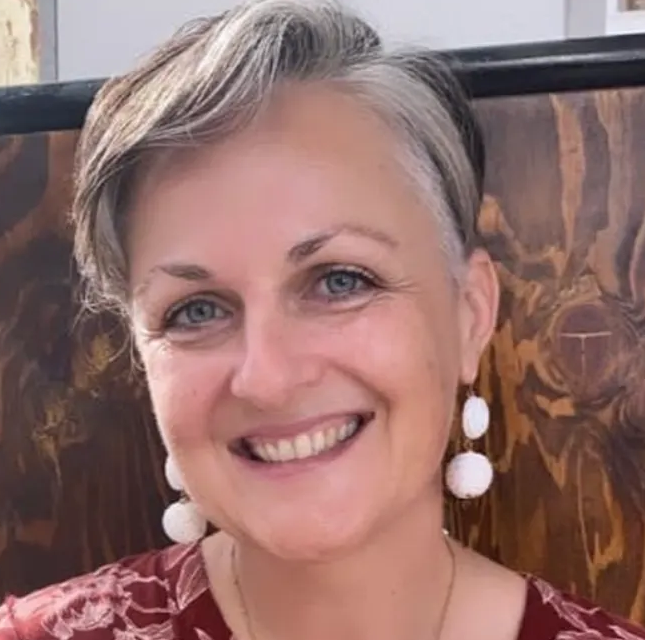
Edina Leković, UCLA Community Scholar in Residence + Founder, LAMHP — L.A. Muslim History Project
I guess I am a Muslim spiritual innovator, and yet I have a hard time (visceral discomfort really) with the word because of its negative association with bid’ah, a term used pejoratively by conservative Muslim scholars for the act of "changing Islam."
While often translated as innovation, a better translation of bid'ah would be invention. I have a tendency to confuse the two, but as I decolonize my own understanding of innovation, I am drawn to it for its power to share Islam with new people in new ways. An innovator sounds like an alchemist to me, when I experience it as creating new ways to access and apply and spread understanding of authentic Islam.
In Islam, the purpose and utility of innovation lie in the need to advance spiritual ways to address novel longings. The novel longings are the ones we find ourselves consumed in the ever-increasing speed of daily life, and the ever-expanding demands on ourselves and our families, and the ever-growing disconnection between self and soul fueled by these same technologies. The purpose of innovation is to achieve transcendence of the current moment in order to access the eternal transcendence of God and the endless universes we exist within – using the technologies and cultural currency of the day.
Today, innovation is required when new human developments take place that were not explicitly named in the Quran. In these cases, we ask: How might the text and the living example of Prophet Muhammad provide insight into a brand new situation that was unknown to mankind in 8th century Arabia?
In the first century after the death of Prophet Muhammad, Islam had spread north, east and west to lands that did not speak Arabic. Two innovations took place by the Muslim leaders – leading daily prayers in the local language, offering sermons in the local language and also the first translations of the Quran. Such innovations were a necessity and an expansion to meet people where they were – in their own place, time and culture.
At the turn of the 21st century, the advent of the world wide web created just the latest innovation revolution - now globalized for 1.5 billion Muslims globally. In 1993, a few tech-focused Muslims in Los Angeles launched IslamiCity, the first website that centralized information about Islam for accessibility of any visitor worldwide. Their website was also one of the first in the English language that offered multiple, searchable versions of the Quranic text in various English translations. Millions of visitors – Muslim and non-Muslim – found IslamiCity and dozens of people actually chose to become Muslim through the sacred text, the reflective blogs, the educational articles, the dynamic videos and the live chats they were able to engage in. The Internet brought Islam alive and accessible in profound new ways. Today, there are dozens of such websites and they’ve grown incredibly sophisticated.
An innovation on this digital dawah (sharing authentic Islam with people) over the past decade has been led by Imam Omar Suleiman, the Palestinian-American, internationally-trained founder of the Yaqeen Institute for Islamic Research in Texas. The virtual mosque, virtual classroom, and virtual office space all provide profound, dynamic volumes of Islamic teachings, wisdom, and insights year-round. The “30 for 30” video series they’ve produced for Ramadan for years is a powerful example of this: short 20-min videos recapping and reflecting on a section of the Quran every day during the month of Ramadan. These videos are viewed by millions each year, and new content is being added all the time.
Today in 2025, I think a lot about what AI will add to the innovations of Quranic accessibility and expansion of authentic Quranic literacy among the 2+ billion Muslims alive today – and to billions more who are curious about or suspicious of Islam on any given day.
For me, this unknown technological horizon is both exhilarating and frightening. As a parent of Gen Alpha kids, I hope that evolving technologies will support, rather than inhibit, their spiritual journeys. Even if they find Islam online, I hope that it will lead them to reach for the Sacred Divine via the printed text and the recited text and the shared experience of reading and reflecting on text together in real life in private and public spaces. Practicing faith and reaching for the sacred in daily life, in the real world, is the kind of full circle innovation that the future is calling for – reaching more for humans around us rather than more tech through our screens.
Read More Definitions of Spiritual Innovation
- Ristina Gooden, Spiritual innovation leader and scholar focused on Black women
- Sandy Hong, Spiritual innovation trainer and practitioner focused on the US and Korean diaspora
- Noosim Naimasiah, Pan-African scholar-activist
- Sid Schwarz, Jewish thought leader and convener of spiritual innovators
- Susumu Shimazono, Japanese sociologist of religion
- Cristine Takuá, Maxakali Indigenous philosopher and educator
- Brandon Vaidyanathan, Catholic sociologist and spiritual innovator

